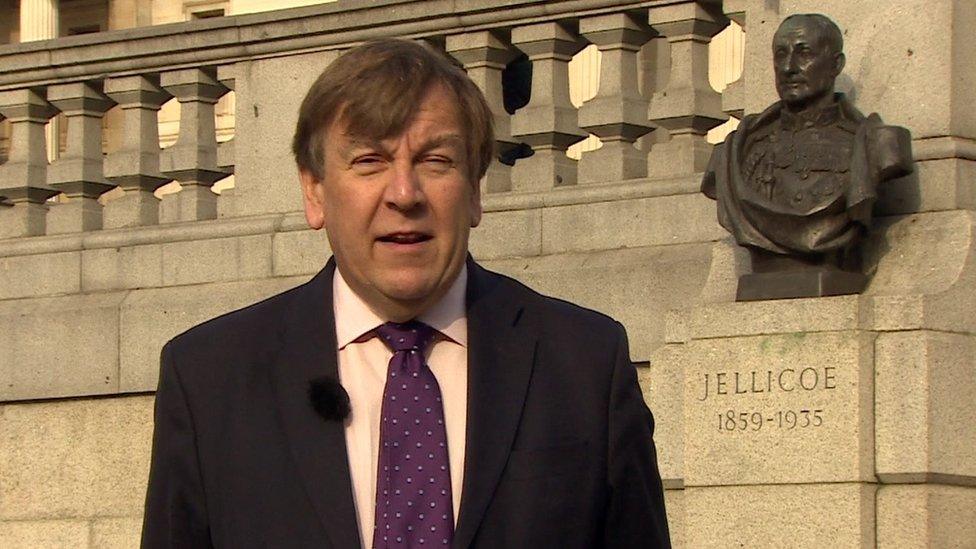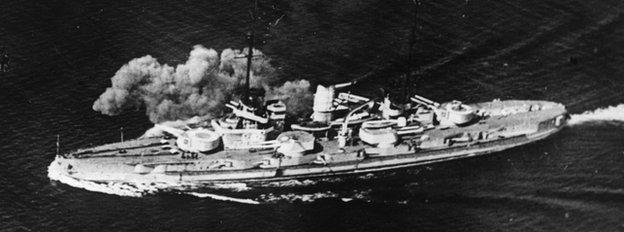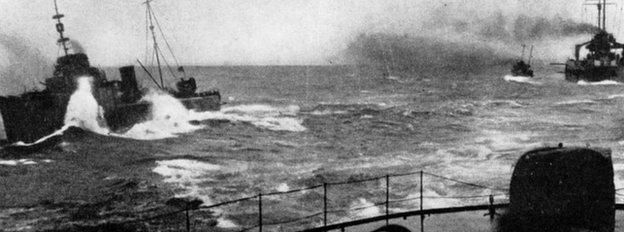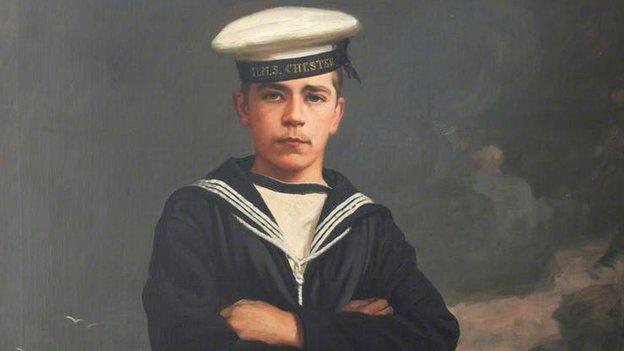WW1's Battle of Jutland: Events planned to mark centenary
- Published
Graham Hobbs and Nick Jellicoe talk about their grandfathers' roles in the Battle of Jutland
Events will be held next year to mark the centenary of the Battle of Jutland, the biggest naval battle in World War One, the government has said.
More than 6,000 British personnel and 2,500 Germans died in the battle, which involved around 250 ships.
A series of commemorative events will take place in the Orkney Islands and elsewhere on 31 May 2016, Culture Secretary John Whittingdale said.
The battle took place on 31 May 1916 in the North Sea near Denmark.
Although it was the only major naval battle of the war, it became the largest sea battle in naval warfare history in terms of the numbers of battleships engaged, and it brought together the two most powerful naval forces of the time.

Mr Whittingdale said he hoped commemorative services would further the knowledge and understanding of younger generations
Mr Whittingdale told the BBC the planned events would be "an opportunity to pay tribute to the people who lost their lives in the battle and to recognise the enormously important role of the Royal Navy".
Events include a service at the UK's most northerly cathedral, St Magnus Cathedral, in Orkney, and a commemoration at the Royal Navy Cemetery at Lyness on the island of Hoy.

The Battle of Jutland

By BBC correspondent Nick Higham
After months of shadow boxing, in which the world's two most powerful navies each sought to lure the other into a trap in the North Sea, it was the only time they met -and only the third full-scale encounter between fleets of "dreadnought" battleships in history. There was never to be another.
For the Royal Navy the battle was a tactical defeat but a strategic victory: the German battleship fleet never again ventured out.
Instead, the Germans switched to indiscriminate submarine warfare in the hopes of starving Britain into peace talks.
But when American ships were among those torpedoed, the United States abandoned neutrality and joined the war on the French and British side, tipping the balance of men, money and materiel decisively against Germany.
For the wartime British public hoping for a second Trafalgar, Jutland was a disappointment.
But worse was to come in that dreadful summer of 1916. A month after Jutland the British and their allies launched their attack on the Somme - a battle in which more than one million men were wounded or killed.

There will also be a wreath-laying ceremony at sea on Jutland Bank by British and German ships, the laying of commemorative paving stones in honour of the four Victoria Cross recipients from the Battle of Jutland and commemoration of casualties buried in Sweden, Norway and Denmark.
HMS Caroline, the last survivor of the Battle of Jutland, will be opened as a museum in Belfast, and there will be a series of services at naval memorials around England including Portsmouth, Plymouth, and Chatham in Kent, as well as events in Germany.
Mr Whittingdale said he hoped these events would help to further the knowledge and understanding of younger generations about the war.

Battle facts:

The British lost 14 ships and the Germans lost 11
The British flagship was HMS Iron Duke which was under the command of Admiral Jellicoe
It is also the battle which the Queen's father - the then Prince Albert, Duke of York - took part in. He was mentioned in despatches for his action as a turret officer aboard HMS Collingwood
Both sides claimed victory

Councillor Jim Foubister, vice convener of Orkney Islands Council, said it was fitting that Orkney would host the national commemoration services because many sailors, who took part in the battle, were buried in Lyness, on the island of Hoy.
He added: "Over the months ahead, children in our schools will look at many aspects of the war, at Orkney's role and the contributions of our forbearers.
"In this way we can help ensure that those who paid the ultimate sacrifice for their countries are never forgotten."
Among those attending services in Orkney will be Nick Jellicoe, who is the grandson of the late Admiral John Jellicoe, who led the British Navy at the Battle of Jutland.
Mr Jellicoe said: "Jutland has been an exciting and rewarding journey of discovery through which I've come to deeply admire a man I never personally knew - my grandfather.
"Listening to other peoples' memories - from my extended family or complete strangers - has brought him to life for me.
"I only wish that I'd asked the one person who knew him better than anyone: my own dad. Those are memories I would have cherished."
- Published8 January 2014
